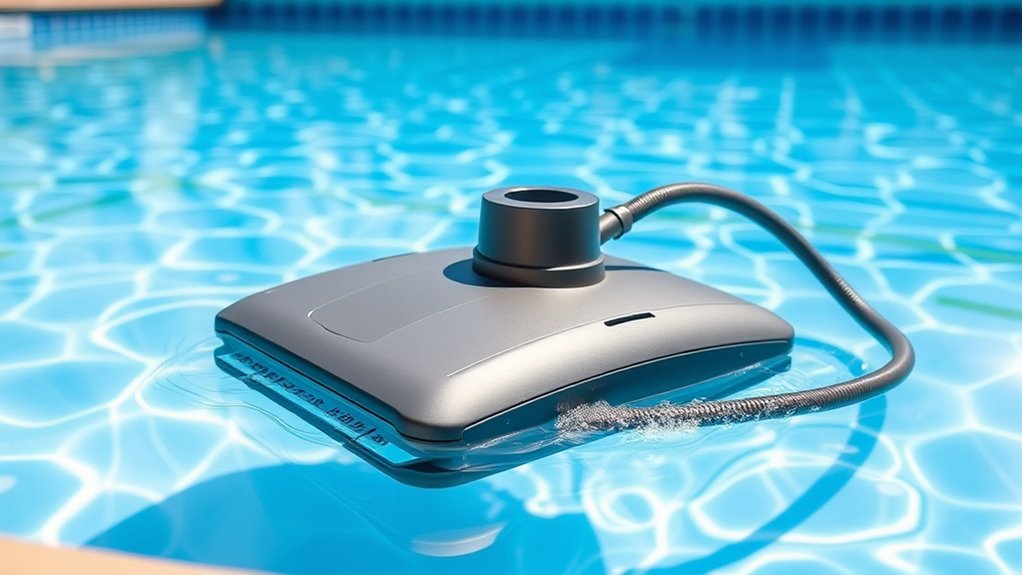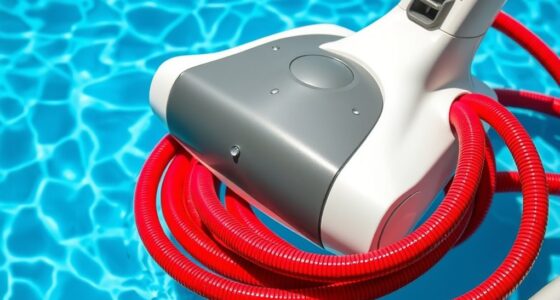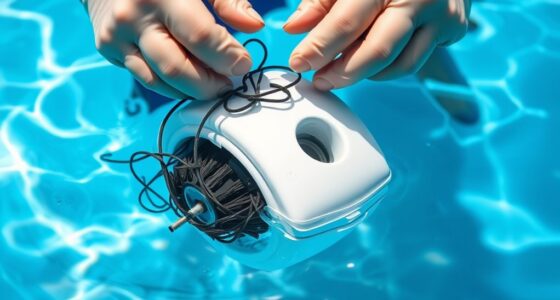A suction pool cleaner can be a great, cost-effective choice if you have a small to medium-sized pool and want simple, routine debris removal. It uses a powerful pump to systematically clean floors and walls, helping you save time and money on maintenance. While it’s low-cost and easy to operate, consider your pool size, type, and debris levels to make certain it’s the right fit. Keep exploring to find out if this cleaner suits your pool’s needs.
Key Takeaways
- Suction pool cleaners are effective for removing dirt, leaves, and bugs, especially in smaller to medium-sized pools.
- They are cost-efficient, require minimal maintenance, and help maintain water quality, making them suitable for budget-conscious users.
- Proper compatibility with your pool’s size, shape, and material ensures optimal performance and longevity.
- They are generally quieter and safer than some robotic cleaners, but consider hose placement to avoid tripping hazards.
- Regular use and maintenance are essential to keep the cleaner functioning effectively and to prevent clogs or malfunctions.
How Suction Pool Cleaners Work

Suction pool cleaners operate by using a powerful pump to create suction that draws debris from the pool floor and walls. Your pool size plays a significant role in how effective the cleaner is; larger pools may require more frequent cleaning or a model with greater suction power. The cleaner moves across the surface, guided by hoses or tracks, systematically removing dirt, leaves, and other debris. To keep your pool consistently clean, it’s essential to establish a regular cleaning schedule based on how often your pool gets used or exposed to debris. Smaller pools may need daily attention, while larger ones might require cleaning every few days. Understanding your pool size helps you choose the right cleaner and set a routine that maintains ideal cleanliness effortlessly.
Benefits of Using a Suction Cleaner
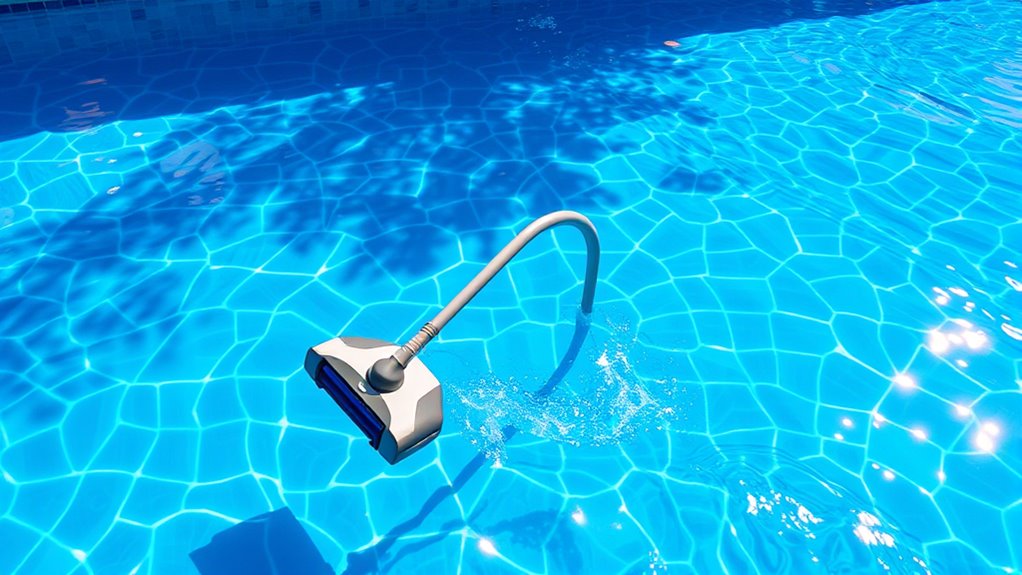
Using a suction pool cleaner makes it easy to remove debris quickly and efficiently. It provides a cost-effective way to keep your pool clean without expensive equipment. Overall, it’s a simple solution that saves you time and money. Additionally, some models utilize electric motors, which can enhance cleaning performance and durability.
Effective Debris Removal
Have you ever wondered how effectively a pool cleaner can keep your pool free of debris? Suction cleaners excel at removing dirt, leaves, and bugs efficiently, regardless of your pool size. They adjust to different debris types and are especially effective with consistent cleaning speed, ensuring no corner is missed. Additionally, their high color accuracy enhances the visibility of debris, making cleaning more effective. The use of advanced automation technologies allows these cleaners to adapt to various pool shapes and debris loads, increasing their efficiency. Using advanced automation technologies, these cleaners can often operate with minimal supervision, saving you time and effort. Regular maintenance of the cleaner also helps prevent clogging and malfunctions, ensuring optimal performance. Moreover, understanding receipt terminology can be helpful when managing warranty claims or troubleshooting issues with your pool cleaner. Imagine a spotless pool, free of clutter, ready for any swim. Here’s how they deliver:
| Pool Size | Cleaning Speed | Debris Removed |
|---|---|---|
| Large | Fast | Every leaf |
| Medium | Moderate | Dirt and bugs |
| Small | Precise | Fine particles |
A suction cleaner’s steady, reliable performance keeps your pool pristine and inviting.
Cost-Effective Cleaning Solution
Are you looking for a budget-friendly way to keep your pool spotless? A suction pool cleaner offers an affordable solution that saves you money in the long run. Unlike robotic cleaners, it doesn’t require expensive parts or frequent replacements. Plus, it helps maintain your pool’s chemical balance by consistently removing debris that can affect water quality. By keeping the pool clean, you reduce the need for excessive chemicals and help prevent algae growth. Its simple design also means less clutter around outdoor pool storage, making setup easy and space-efficient. Over time, a suction cleaner minimizes maintenance costs and keeps your pool inviting without breaking the bank. Additionally, using a suction cleaner can improve cash flow management by reducing ongoing expenses and ensuring consistent pool maintenance. Incorporating Kia Tuning into your pool care routine can inspire innovative ways to optimize cleaning efficiency and enjoy your pool more fully. Staying informed about cost-effective cleaning options can help you make smarter decisions for your pool upkeep. If you want a reliable, economical cleaning option, a suction pool cleaner is a smart choice.
Potential Drawbacks to Consider
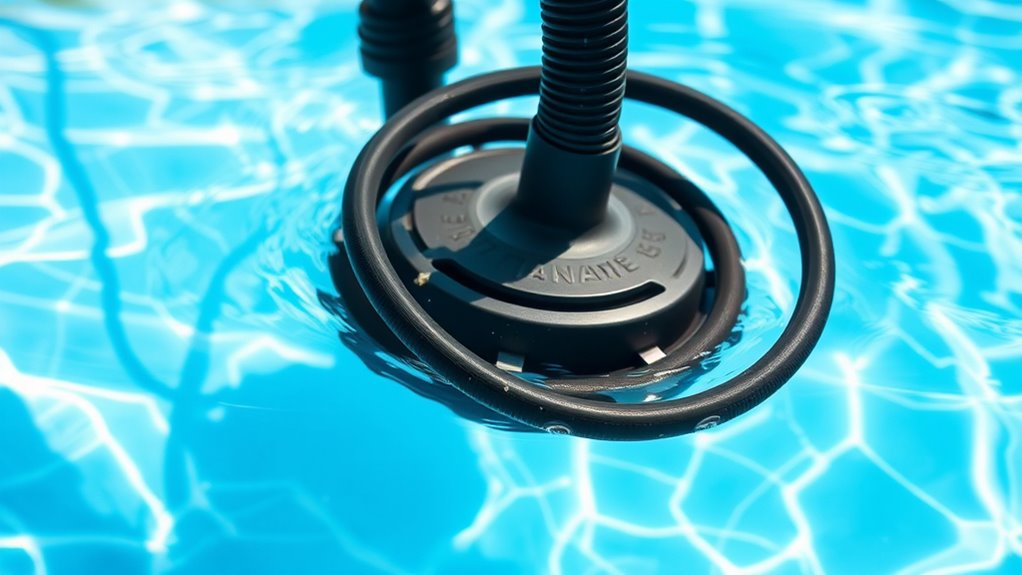
While suction pool cleaners can be effective, they do have some potential drawbacks to keep in mind. Safety concerns are worth noting, especially if the cleaner’s hoses or cords aren’t securely positioned, creating tripping hazards near the pool. Additionally, some models generate high noise levels during operation, which can be disruptive, particularly in quiet or shared environments. The noise might also bother pets or neighbors. These issues don’t necessarily outweigh the benefits, but you should consider how they could impact your pool area. Proper setup and choosing a quieter model can help mitigate these concerns. Understanding the types of home security systems and their potential drawbacks allows you to better weigh whether a suction pool cleaner fits your needs and environment. It’s also important to consider the maintenance requirements of different models to ensure long-term effectiveness and safety. Being aware of the cybersecurity vulnerabilities associated with pool automation systems can help protect your smart equipment from potential cyber threats. Additionally, considering the compatibility with existing systems can ensure seamless integration and operation.
Compatibility With Different Pool Types
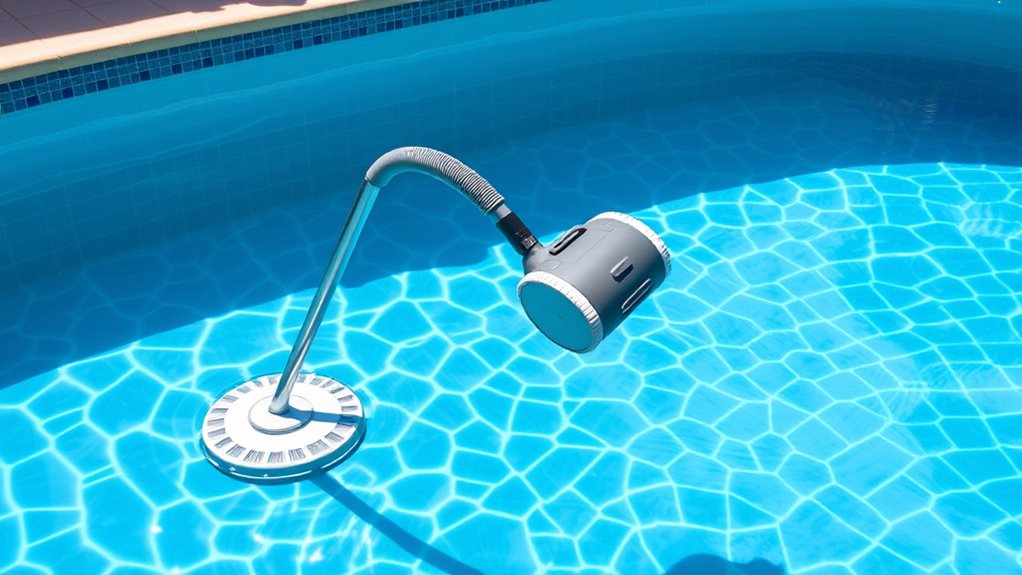
Compatibility with different pool types is an important factor to contemplate when choosing a suction pool cleaner. Not all cleaners work equally well with every pool material or water chemistry. For example, vinyl pools may require gentle brushes to prevent damage, while concrete pools need more robust suction and scrubbing power. Additionally, water chemistry affects the cleaner’s effectiveness; high mineral content or algae buildup might clog or hinder performance. To guarantee proper compatibility, consider these factors:
- Pool Material – select a cleaner suited for your pool’s surface to avoid damage.
- Water Chemistry – ensure the cleaner can handle your pool’s chemical balance. Understanding water chemistry effects is crucial for maintaining optimal cleaner performance.
- Pool Shape and Size – verify the cleaner’s ability to navigate and cover the area efficiently.
- Proper compatibility also depends on understanding water chemistry effects, ensuring the cleaner can operate effectively in varying chemical conditions.
Matching your cleaner to your pool type ensures peak performance and longevity.
Maintenance and Operating Costs
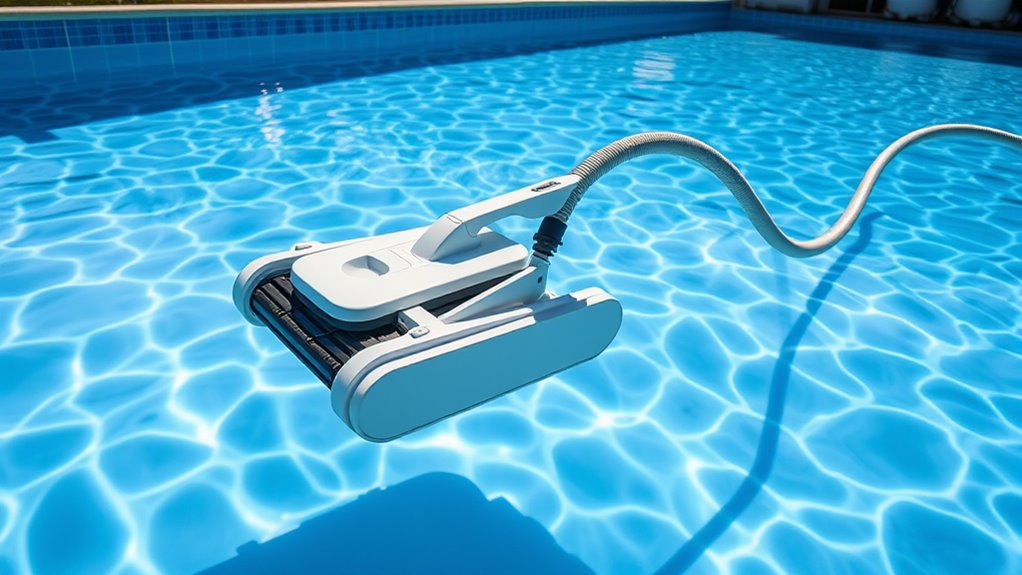
Understanding the maintenance and operating costs of your suction pool cleaner can help you budget effectively. You’ll want to contemplate its energy consumption, ongoing maintenance expenses, and the costs of replacing parts over time. Being aware of these factors lets you keep your pool clean without surprises. Additionally, considering industry trends can inform you about innovative features that may reduce long-term costs. Monitoring advancements in energy-efficient technologies might lead to more cost-effective choices for pool maintenance. Regularly evaluating the performance and durability of your cleaner can also contribute to minimizing future expenses, especially as micro-microphones continue to evolve with enhanced durability and efficiency. Staying informed about AI integration in pool equipment could further optimize your maintenance routines and reduce costs over time.
Energy Consumption Levels
Suction pool cleaners generally consume less energy than traditional robotic or pressure-side cleaners, making them a cost-effective choice for many pool owners. Their lower power consumption not only reduces your electricity bills but also lessens the environmental impact. You’ll appreciate how efficient these cleaners are, which helps conserve energy over time. Additionally, understanding digital literacy programs can help seniors communicate more playfully and stay connected through technology.
Maintenance Expenses Overview
Compared to traditional pool cleaning systems, suction pool cleaners generally have lower maintenance and operating costs. They require less frequent parts replacement and minimal energy, saving you money over time. Regular pool chemical balancing helps prevent algae buildup and extends the cleaner’s lifespan, reducing repair expenses. Additionally, choosing the right pool cover options can protect your pool from debris, decreasing the workload for your cleaner and lowering overall maintenance needs. These covers also help maintain chemical stability, further reducing chemical costs. While suction cleaners are simple to operate, staying on top of routine tasks like pool chemical balancing and cover maintenance keeps your system efficient and cost-effective. Overall, they offer a budget-friendly option that minimizes ongoing expenses.
Replacement Part Costs
Because suction pool cleaners have fewer moving parts and simpler mechanisms, their replacement part costs tend to be lower than those of more complex systems. For your pool size, this means fewer expenses if parts need replacing. Typically, the main components you might replace include the vacuum bag or filter, hoses, and the drive mechanism.
Here are some key points:
- Smaller pool sizes usually mean less strain on parts, reducing replacement costs.
- Maintaining the aesthetic appeal is easier since fewer parts break or wear out.
- Replacement parts are generally affordable, helping you keep operating costs low over time.
Making the Right Choice for Your Pool
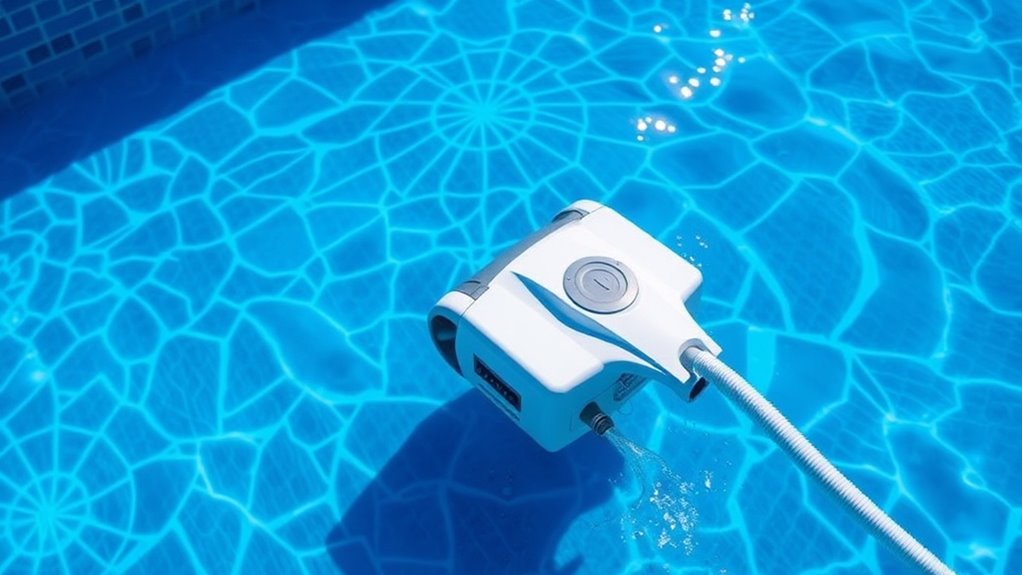
Choosing the right pool cleaner depends on your specific needs and the type of pool you have. First, consider your pool size—larger pools may require a more powerful or automatic cleaner, while smaller pools can often be handled manually or with simpler devices. Think about your user preferences: do you want a set-it-and-forget-it solution, or are you comfortable handling manual cleaning tasks? If you prefer minimal maintenance, a suction pool cleaner could be ideal, as it’s generally easy to operate and maintain. However, if you want thorough cleaning for a large or complex pool, you might need a more advanced or robotic option. Assess your budget, pool size, and cleaning habits to choose a cleaner that fits your lifestyle and keeps your pool pristine.
Frequently Asked Questions
Can Suction Pool Cleaners Handle Large Debris Effectively?
Suction pool cleaners can handle large debris, but their debris capacity varies, so you should check the model’s limit. They’re generally effective at cleaning, especially with good brush effectiveness that helps dislodge stubborn dirt. However, for very large debris like sticks or leaves, some cleaners might clog or require frequent emptying. If your pool has lots of big debris, consider a model with a larger debris capacity for smoother, more efficient cleaning.
How Long Does It Typically Take to Clean a Pool?
Did you know that most pools take about 2 to 3 hours to clean manually? When you opt for a suction pool cleaner, you save time and reduce manual operation. These cleaners are energy-efficient, consuming less power than traditional methods. Typically, a suction cleaner takes around 2 hours to thoroughly clean your pool, making it a convenient choice for busy schedules without sacrificing cleanliness or efficiency.
Are Suction Cleaners Suitable for Covered or Indoor Pools?
Suction pool cleaners are generally suitable for indoor pool cleaning and can work well with pool cover compatibility, as long as the cleaner’s hose connects easily to your skimmer or dedicated suction line. However, if your indoor pool has a cover that limits access or creates a sealed environment, a suction cleaner might struggle. Consider your pool’s setup and cover type to determine if a suction cleaner fits your indoor pool cleaning needs.
Do Suction Pool Cleaners Work Well With Saltwater Pools?
Think of a suction pool cleaner like a loyal pet that eagerly cleans your pool. It works well with saltwater compatibility and handles various pool surface types, from vinyl to concrete. You’ll find it effective at removing debris and keeping your saltwater pool sparkling. Just guarantee your cleaner is compatible with your pool’s surface, and you’ll enjoy effortless maintenance without worrying about corrosion or damage.
What Safety Precautions Should I Take During Maintenance?
During maintenance, you should prioritize safety by wearing gloves and eye protection to prevent chemical splashes. Always turn off the power supply before handling electrical components to avoid hazards. Keep chemicals stored properly and follow label instructions for chemical safety. Regularly inspect electrical connections for damage or corrosion. By adhering to these precautions, you protect yourself from electrical hazards and ensure safe handling of chemicals, keeping your pool maintenance safe and effective.
Conclusion
Choosing a suction pool cleaner could save you up to 50% on maintenance time and costs. With over 70% of pool owners reporting cleaner pools and less manual effort, it’s clear these devices make pool maintenance easier. If you value convenience and efficiency, a suction cleaner might be your best fit. Just weigh the benefits against potential drawbacks, and you’ll be well on your way to enjoying a crystal-clear pool all season long.
